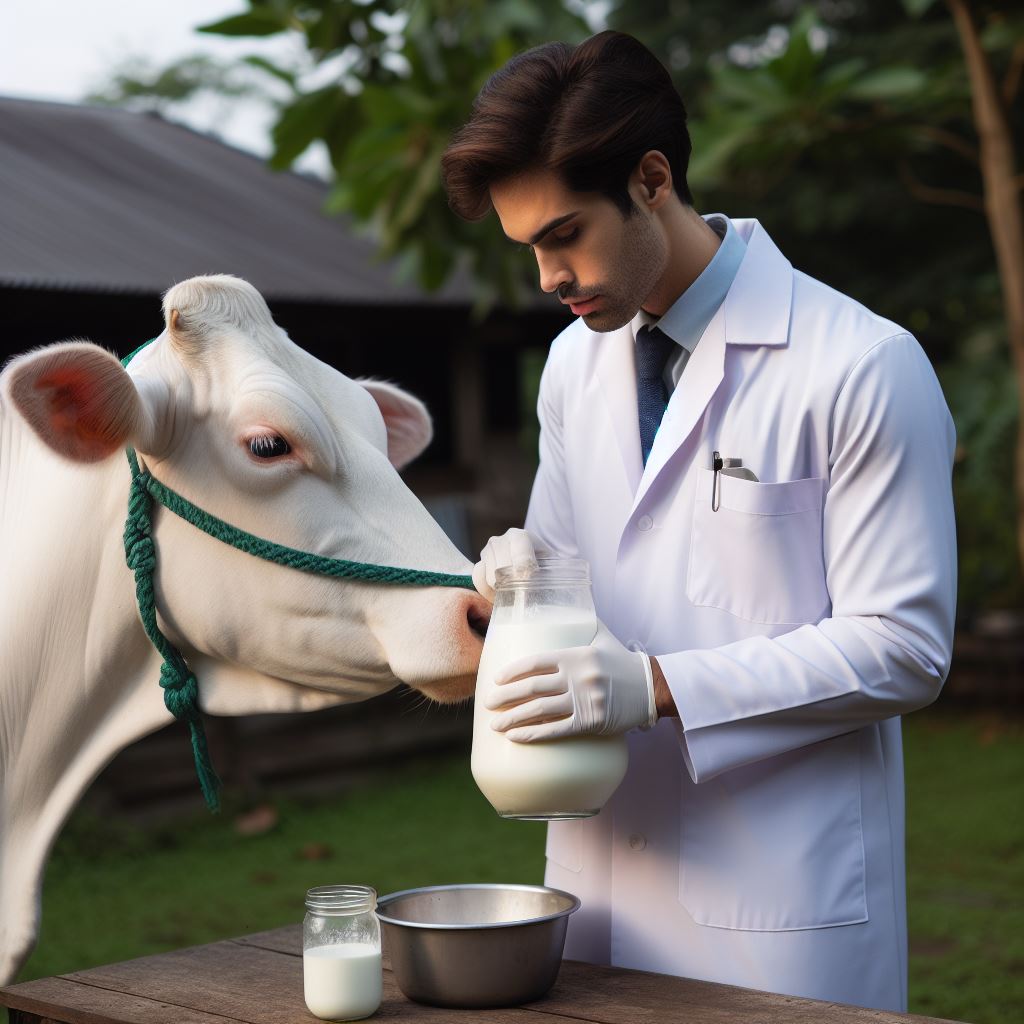Introduction
Let’s Explore Dairy Cow Diet Essentials for Maximum Milk Yield
For dairy farmers aiming for maximum milk yield, prioritizing a balanced diet for their cows is indispensable.
The significance of this dietary aspect cannot be overstated as it directly correlates with the success of milk production endeavors.
- Nutrient Requirements: Ensuring dairy cows receive the necessary nutrients is fundamental. From proteins to vitamins and minerals, each component plays a vital role in the overall health of the cow and its milk-producing capabilities.
- Feed Composition: Striking the right balance in feed composition is crucial. A mix of grains, forages, and supplements, coupled with a keen understanding of the specific dietary needs of dairy cows, contributes to their well-being and, consequently, optimal milk production.
- Energy-Dense Diets: Dairy cows require a considerable amount of energy to sustain milk production. Providing energy-dense feeds becomes imperative in supporting the lactation process and maintaining the health of the animals.
- Protein-Rich Feeds: Adequate protein intake is directly linked to milk synthesis. Dairy farmers should focus on incorporating protein-rich feeds into the cows’ diets to promote healthy milk production and overall physiological functions.
Taking a comprehensive approach to dairy cow nutrition is not only a responsibility but a strategic move for farmers seeking consistent and high milk yields.
The commitment to providing a well-rounded diet contributes not only to the well-being of the cows but also to the sustainability and success of the dairy farming operation.
The Basic Nutritional Needs of Dairy Cows
Dairy cows have specific dietary needs to ensure maximum milk yield.
Meeting these requirements is essential to maintain their overall health and productivity.
This blog section will delve into the basic nutritional needs of dairy cows, including energy requirements, protein requirements, and the role of vitamins and minerals.
Energy Requirements
Energy is a crucial component of a dairy cow’s diet.
To achieve maximum milk yield, cows need an adequate supply of calories derived from carbohydrates and fats.
These energy sources provide the fuel needed for milk production, growth, and maintenance.
Maintaining a proper body condition score is equally important.
Cows that are too thin may not produce enough milk, while overweight cows may face fertility problems.
Regular monitoring and adjustment of the diet can help maintain an optimal body condition score, ensuring high milk production.
Protein Requirements
Protein plays a vital role in the production of milk. It provides the necessary amino acids for the synthesis of milk proteins.
Transform Your Agribusiness
Unlock your farm's potential with expert advice tailored to your needs. Get actionable steps that drive real results.
Get StartedMeeting the protein requirements of dairy cows is crucial for ensuring optimal milk yield and quality.
Dairy farmers can provide protein to cows through various sources.
Forages, such as alfalfa and clover, are rich in protein and can be an essential part of a cow’s diet.
Grains, such as corn and soybean meal, can also serve as excellent sources of protein.
Protein supplements can be added to the diet to meet the cow’s specific protein needs.
Vitamins and Minerals
Vitamins and minerals are essential for the health and productivity of dairy cows.
Certain vitamins, including A, D, E, and B-complex vitamins, contribute to proper immune function, reproductive performance, and overall cow health.
These vitamins can be obtained through a balanced diet and proper forage selection.
Minerals are also crucial for optimum milk production. Calcium, phosphorus, magnesium, and potassium are among the essential minerals needed by dairy cows.
They play significant roles in bone development, muscle function, and overall metabolic processes.
Dairy farmers must ensure that the cow’s diet includes adequate amounts of these minerals to support maximum milk yield.
Providing the basic nutritional needs of dairy cows is crucial for maximizing milk yield.
Energy from carbohydrates and fats, maintaining a proper body condition score, meeting protein requirements, and ensuring an adequate supply of vitamins and minerals are all vital aspects of cow nutrition.
By understanding and meeting these needs, dairy farmers can ensure the health, productivity, and profitability of their dairy herds.
Read: Layer Hen Feed: Boosting Egg Production Naturally
Forage Component of the Diet
When it comes to maximizing milk yield in dairy cows, one of the essential components of their diet is forage.
Forage, which consists of plants such as grasses and legumes, plays a crucial role in providing the necessary nutrients for milk production and maintaining rumen health.
Importance of high-quality forage
1. Nutritional value of good forages
High-quality forages contain essential nutrients such as carbohydrates, proteins, and minerals, which are necessary for the cow’s overall health and milk production.
These nutrients are easily digestible and support the cow’s energy requirements.
2. Stabilizing rumen pH
Forages, especially those high in fiber, help maintain a stable pH in the rumen, which is vital for optimal rumen function.
The fermentation of forages produces volatile fatty acids that promote a healthy rumen environment.
Types of forages
1. Types of grasses and legumes commonly used
Common grasses used for forage include ryegrass, timothy grass, and orchardgrass.
Legumes such as alfalfa and clover are also commonly included in dairy cow diets due to their high protein content.
2. Benefits of including forages in the diet
Including forages in the diet provides several benefits for dairy cows.
Showcase Your Farming Business
Publish your professional farming services profile on our blog for a one-time fee of $200 and reach a dedicated audience of farmers and agribusiness owners.
Publish Your ProfileThey contribute to rumen health, reduce the risk of nutrient imbalances, improve milk fat and protein content, and promote better cow behavior by providing rumination activity.
Balancing forage quality and quantity
1. Proper forage analysis
It is important to conduct regular forage analysis to determine the nutritional value of the forages being fed to the cows.
This analysis helps identify any deficiencies or excesses in nutrient content, allowing for adjustments to optimize the diet.
2. Ensuring enough forage intake without compromising nutrition
While it is crucial to provide enough forage to meet the cow’s intake requirements, it is equally important not to compromise the overall nutrition of the diet.
Balancing the quality and quantity of forages ensures that the cow receives sufficient nutrients without overloading on one particular component.
Most importantly, the forage component of a dairy cow’s diet is essential for maximizing milk yield.
High-quality forages provide the necessary nutrients and support rumen health, while the inclusion of various grasses and legumes offers multiple benefits.
Balancing the quality and quantity of forages through proper analysis ensures optimal nutrition without compromising the cow’s well-being.
By prioritizing the forage component, dairy farmers can enhance milk production and maintain healthy, productive cows.
Read: Sheep Feeding 101: Nutrition for Flock Health

Concentrate Component of the Diet
In order to maintain high milk yield in dairy cows, the concentrate component of their diet plays a crucial role.
Concentrates are rich in energy and protein, which are essential nutrients for milk production.
This section will discuss the types of concentrates commonly used, strategies for maximizing energy utilization, different protein sources, meeting protein requirements, and the importance of balancing concentrate ingredients.
Energy-rich concentrates
1. Types of grains and byproducts commonly used
Dairy farmers have several options when it comes to energy-rich concentrates for their cows
Common grains and byproducts include corn, barley, wheat, and oat.
By products such as corn silage, wheat bran, and distillers grains can also serve as energy sources.
2. Feeding strategies for maximizing energy utilization
Aside from providing a variety of energy-rich concentrates, it is important to implement feeding strategies that optimize energy utilization.
This includes ensuring consistent intake, avoiding abrupt dietary changes, and maintaining a proper forage-to-concentrate ratio.
Protein-rich concentrates
1. Different protein sources (e.g., soybean meal, distillers grains)
Protein is crucial for milk production, and dairy farmers often include protein-rich concentrates in their cows’ diets.
Soybean meal and distillers grains are commonly used protein sources due to their high protein content and availability.
2. Meeting protein requirements based on cow’s lactation stage
The protein requirements of dairy cows vary depending on their stage of lactation.
Cows in early lactation require higher protein levels to support milk production, while cows in late lactation may have lower protein requirements.
Adjusting the protein content in the concentrate can help meet these specific needs.
Balancing concentrate ingredients
1. Ensuring appropriate ratios for energy and protein
The overall balance between energy and protein in the concentrate is crucial for optimal milk production.
It is important to calculate and adjust the ratios of energy and protein sources to meet the cow’s specific nutritional requirements for high milk yield.
2. Factors to consider when formulating the concentrate mix
When formulating the concentrate mix, dairy farmers need to consider several factors such as cow breed, body condition score, stage of lactation, and milk production goals.
The diet should be tailored to meet the specific needs of the cows and promote maximum milk yield.
In essence, the concentrate component of a dairy cow’s diet is essential for achieving maximum milk yield.
Energy-rich concentrates and protein-rich concentrates provide the necessary nutrients for milk production.
By selecting appropriate grains and balancing the ratios of energy and protein, dairy farmers can ensure their cows receive a well-balanced diet that supports high milk production.
Implementing feeding strategies and considering individual cow requirements are also crucial for optimizing the utilization of these concentrates and ultimately maximizing milk yield.
Read: Top Tech in Modern Cattle Farming
Supplementary Feed and Water
Role of supplements in meeting nutritional needs
Supplements, such as minerals, vitamins, and additives, are essential components when it comes to meeting the nutritional requirements of dairy cows.
These supplementary feed options play a crucial role in achieving maximum milk yield and promoting the overall health of the herd.
1. Importance of minerals, vitamins, and additives
Dairy cows have specific nutritional needs that cannot always be met through forage or basic feed alone.
This is where supplements come into play. They provide the necessary additional minerals, vitamins, and additives that may be lacking in the cow’s primary diet.
Calcium, phosphorus, and magnesium are some of the vital minerals required for milk production.
Vitamins like vitamin A, D, and E are also essential for the cow’s overall health and reproductive performance.
Certain additives, such as yeast or probiotics, can enhance rumen fermentation and improve nutrient utilization.
This results in increased feed efficiency and ultimately higher milk yields.
Showcase Your Farming Business
Publish your professional farming services profile on our blog for a one-time fee of $200 and reach a dedicated audience of farmers and agribusiness owners.
Publish Your Profile2. Balancing supplement inclusion with the overall diet
While supplements are crucial, it’s important to strike the right balance when including them in a cow’s diet.
Too much supplementation can lead to imbalances or toxicities, adversely affecting the cow’s health and productivity.
On the other hand, inadequate supplementation may result in nutrient deficiencies, leading to suboptimal milk production and poor herd performance.
To ensure an effective supplementary feeding program, it is advisable to work closely with a qualified nutritionist who can analyze the cow’s nutritional requirements, evaluate the existing diet, and recommend appropriate supplements tailored to the specific needs of the dairy cows.
Water requirements for dairy cows
Water is an often overlooked but critical component in a dairy cow’s diet and overall well-being.
It is important to provide clean and fresh water to ensure optimal milk production and cow health.
1. The significance of clean and fresh water
Dairy cows require access to a constant supply of clean, fresh water throughout the day.
Water intake is closely associated with feed intake, rumen function, and nutrient utilization.
Insufficient water availability can lead to decreased dry matter intake, poor digestion, and, consequently, reduced milk yields.
Water plays a vital role in regulating body temperature, nutrient transport, and waste elimination within the cow’s body.
2. Proper water availability to maximize milk production
To maximize milk production, it is crucial to ensure adequate water availability.
Water sources should be clean, free from contaminants, and easily accessible for the cows.
Regular monitoring of water troughs and automatic waterers is necessary to prevent any blockage or contamination issues.
During hot weather or high-stress periods, the water intake of dairy cows tends to increase.
Therefore, it is important to carefully consider and adjust water availability during such times to support their increased needs.
In fact, supplements, including minerals, vitamins, and additives, are indispensable in meeting the nutritional requirements of dairy cows for maximum milk yield and overall herd health.
Balancing their inclusion with the overall diet is crucial to avoid imbalances or deficiencies.
Clean and fresh water availability is essential to support optimal milk production and ensure the well-being of dairy cows.
By paying attention to these factors, dairy farmers can promote the productivity and welfare of their herds.
Read: Effective Breeding Strategies for Beef
Feeding Strategies for Maximum Milk Yield
Frequent and consistent feeding schedule
Establishing a regular feeding routine is vital for dairy cows.
Not only does it enhance the overall well-being of the animals, but it also contributes to higher milk production.
1. Benefits of regular feeding times
A fixed feeding schedule helps cows anticipate meal times, allowing their digestive systems to function optimally.
It promotes better rumen health, digestion, and nutrient absorption.
2. Ensuring consistent access to feed
Providing cows with consistent access to feed throughout the day ensures a constant supply of essential nutrients.
This helps maintain milk production and supports cow health and well-being.
Proper feed management and storage
Efficient feed management and storage practices are crucial to prevent spoilage and optimize nutrient availability for dairy cows.
1. Reducing feed spoilage and waste
Proper feed storage techniques, such as using airtight containers and maintaining appropriate temperature and humidity, help minimize spoilage
Regularly inspecting feed for mold or pests is also essential.
2. Optimizing nutrient availability
Ensuring feed ingredients are fresh and of high quality enhances nutrient availability for the cows.
Balancing the diet with the right proportions of carbohydrates, protein, fats, vitamins, and minerals is crucial for maximum milk production.
Monitoring cow health and performance
Regular monitoring of cow health and performance allows farmers to detect any issues early and make necessary adjustments to the diet.
1. Observing body condition and weight
Regularly assessing a cow’s body condition score and weight helps identify any changes that may indicate health problems or nutritional deficiencie
This information allows for timely intervention.
2. Adjusting the diet based on individual needs
Each cow has unique nutritional requirements.
By monitoring individual cow performance and adjusting their diet accordingly, dairy farmers can ensure optimal milk yield and overall cow well-being.
In short, implementing proper feeding strategies is essential for maximizing milk yield in dairy cows.
Establishing a consistent feeding schedule, managing feed effectively, and closely monitoring cow health and performance contribute to a productive and healthy herd.
Conclusion
We have discussed the key points regarding dairy cow diet essentials for maximum milk yield.
It is crucial to understand the importance of proper nutrition in achieving maximum milk production.
Showcase Your Farming Business
Publish your professional farming services profile on our blog for a one-time fee of $200 and reach a dedicated audience of farmers and agribusiness owners.
Publish Your ProfileBy providing the right balance of energy, protein, vitamins, and minerals, dairy cows can reach their full potential.
The diet should consist of high-quality forages, grains, and supplements to meet the cows’ nutritional requirements.
Proper feeding management, including regular monitoring and adjusting the diet according to the cow’s needs, plays a significant role in maximizing milk yield.
Adequate water availability and a comfortable housing environment are equally important factors.
By prioritizing the nutrition and overall well-being of dairy cows, farmers can ensure higher milk yields and better profitability.




